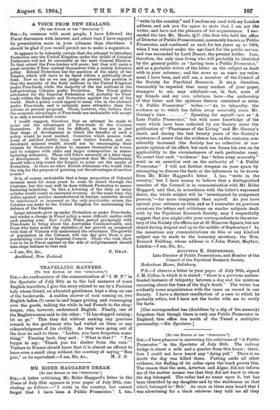It appears to be tolerably certain that the attempt to
introduce Protection into the United Kingdom under the shield of Colonial Preference will not be successful at the next General Election. To that extent the Free-traders will score; but they will make a great mistake if' hey content themselves with a merely defensive policy. Behind Protection lies the question of the unity of the Empire, which will have to be faced within a politically short time. Now so far as we can judge at present, the position is that the majority of the forty millions in the United Kingdom prefer Free-trade, while the majority of the ten millions in the self-governing Colonies prefer Protection. The Fiscal policy advocated for the Imperial Federation will probably be Free- trade within the Empire and Protection against the rest of the world. Such a policy would appeal to many who in the abstract prefer Free-trade, and is certainly more attractive than the scheme at present proposed. Those, however, who believe that the economic advantages of Free-trade are undeniable will accept it as only a second-best course.
I would suggest, therefore, that an attempt be made to point out the advantages of Free-trade to the Colonies themselves. It should not be difficult, as they are in just that stage of development in which the benefits of such a policy would be most marked. Countries which possess wide areas of untilled fertile land, vast timber forests, and un- developed mineral wealth should not be encouraging their citizens by Protective duties to immure themselves in towns, and to compete with older and larger communities in manu- facturing industries. These will follow naturally at a later stage of development. It has been suggested that Mr. Chamberlain should take a trip round the Empire to point out the merits of Protection. Is there no other British statesman who would take the trip for the purpose of pointing out the advantages of another course ?
It is, of course, undeniable that a large proportion of Colonial revenue must for many years to come be raised through the Customs; but this may well be done without Protection to manu- facturing industries. In fact, a lowering of the duty on many articles would result in increased revenue. At the same time, the duties against articles manufactured in foreign countries should be maintained or increased as the only practicable return the Colonies can make to the United Kingdom for maintaining the defence of the Empire.
Large interests grow up under Protection or under Free-trade, and render a change in Fiscal policy a more difficult matter with each passing year. New South Wales parted grudgingly with Free-trade to bring about the Australian Commonwealth, and those who have noted the statistics of her growth as compared with that of Victoria will understand the reluctance. The growth of population in the Colonies will one day give them a pre- ponderating voice in an Imperial Council. Those who wish their vote to be in Fiscal matters on the side of enlightenment should take steps betimes to that end.
—I am, Sir, &c., S. GRAY.
Auckland, New Zealand.
TRAVELLING MANNERS.






































 Previous page
Previous page